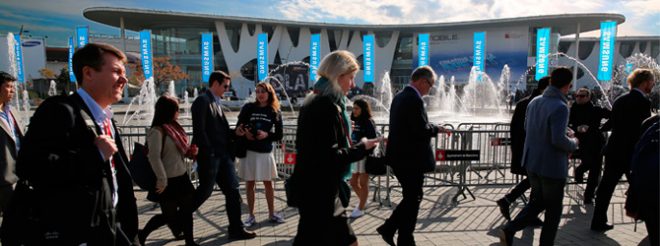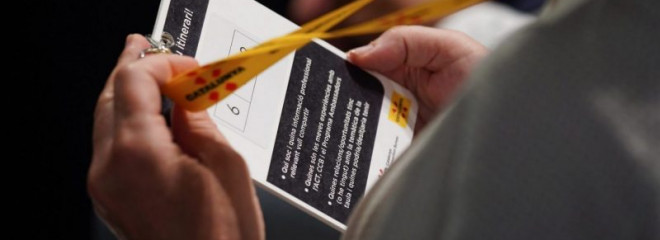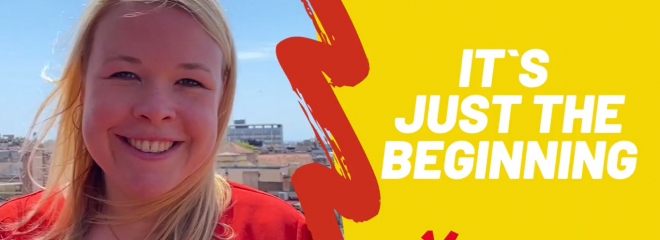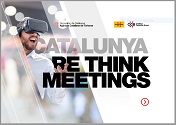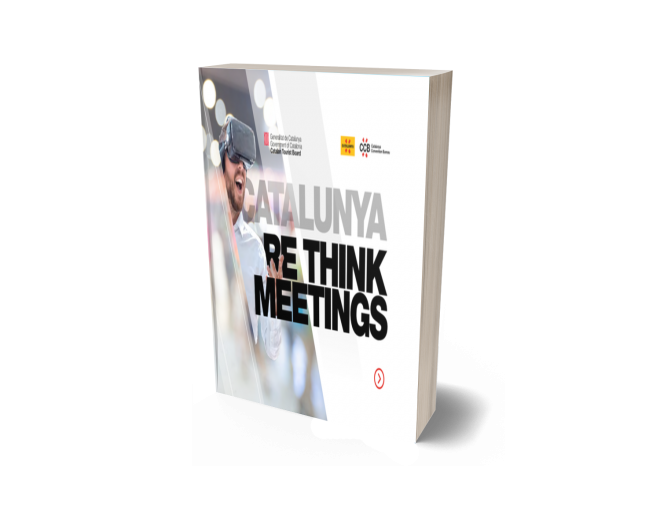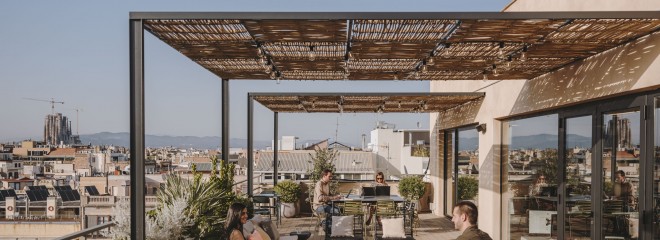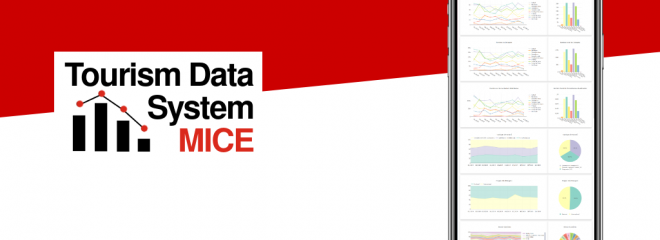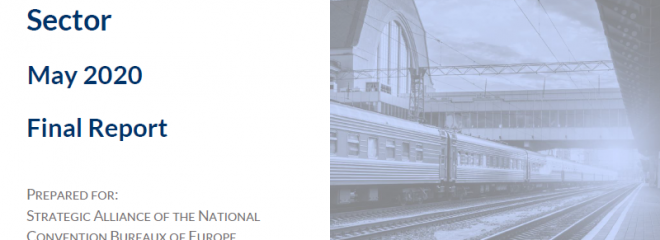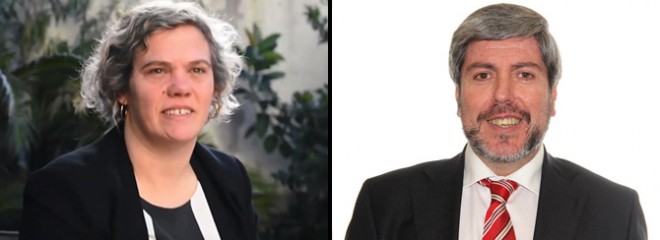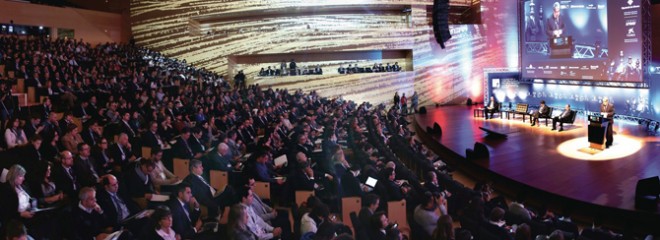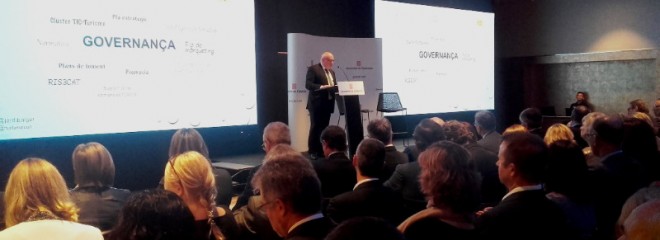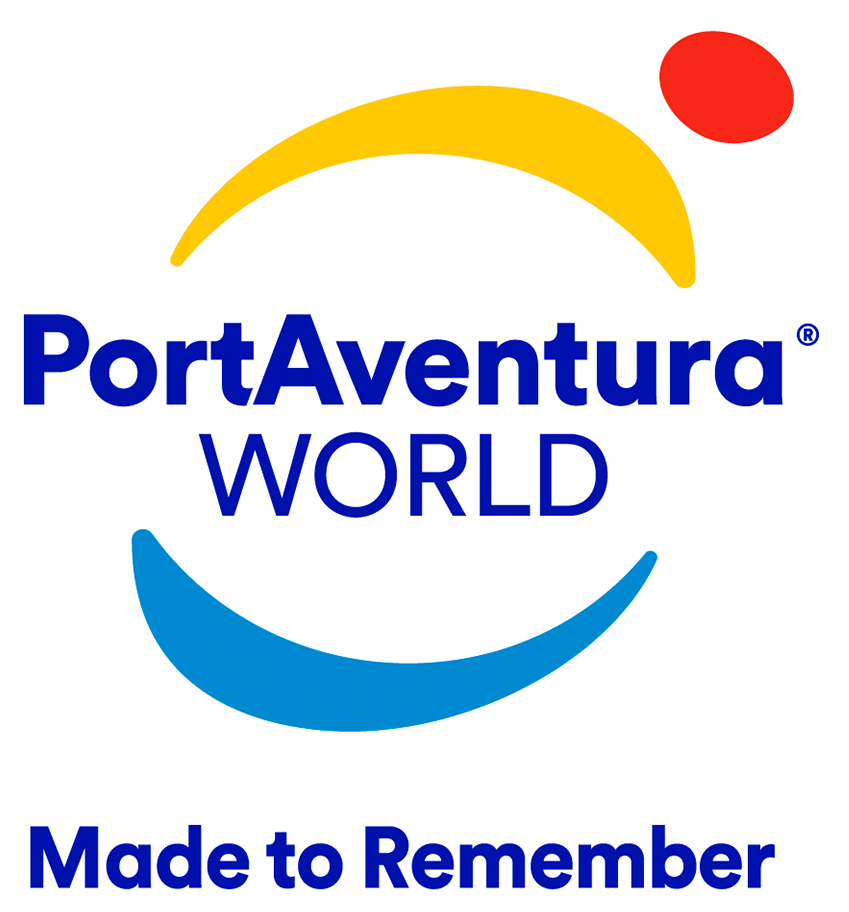New Catalunya Convention Bureau members
The CCB welcomes 14 new members. These companies strengthen the wide and diverse range of MICE suppliers in Catalonia.
| Company | Type | City |
| Castell de Raymat | Venue | Lleida |
| Formula GT | Complementary service | Vic |
| Circuit de Calafat | Venue | Calafat |
| Hotel Hilton Diagonal Mar | Hotel | Barcelona |
| Hotel Castell de l’Empordà | Hotel | La Bisbal de l’Empordà |
| Hotel CMC Girona | Hotel | Girona |
| Hotel Don Candido | Hotel | Terrassa |
| Hotel Jou Nature | Hotel | Guardiola de Berguedà |
| Hotel Terraverda Empordà | Hotel | Gualta |
| Jolly DMC | DMC | Calella |
| Restaurant Windsor | Restaurant | Barcelona |
| SM Experiences | Complementary service | Sant Cugat del Vallès |
| Viatges Viñolas | DMC | Roses |
| World Trade Center | Venue | Barcelona |
#CatalunyaInspires MICE influencers campaign
The Catalunya Convention Bureau has launched an influencer marketing campaign aiming to highlight Catalonia as an innovative, safe and sustainable MICE destination. #CatalunyaInspires key message focuses on hybrid and nature-connected events, and on applied-to-MICE new technologies. The campaign is led by the German events and tech passionate, Sina Bünte, a CMP-certified meetings professional with extensive knowledge in organizing hybrid, online and in-person events. Bünte is Co-founder & Director Events at SheSharp, which aim it is to foster diversity and inclusion in technology and entrepreneurship, and manager at EventProfsBreakShit, a passion project to bring event professionals together to test Event Tech.
The campaign has started in July with Sina’s attendance to the Mobile World Congress Barcelona 2021 (first big in-person trade show since the pandemic started) followed by a site visit to Catalunya with the support of: Barcelona Convention Bureau, Baix Llobregat Convention Bureau, Sitges Convention Bureau, Costa Daurada Convention Bureau, Girona City Convention Bureau, Lloret Convention Bureau and Costa Brava Girona Convention Bureau. Throughout the campaign for the next few months, Bünte will be posting about her trip experiences and meetings with Catalan event professionals.
“I’ve noticed that the entire region really focuses on technology and innovation. Everybody is somehow connected in this network of tech startups. But not only that. Within a couple of minutes or hours you are in the nature. So that makes this region truly unique”.
Download your Rethink Meetings e-book
The Catalunya Convention Bureau has published an e-Book with inspirational ideas for an innovative event. The Rethink Meetings publication has information and suggestions (including MICE & TECH providers) about hybrid and virtual events, gamification, low-tech activities, immersive experiences, health and safety emerging technologies, multi-site meetings… The publication features, among other interesting content, the testimonial of Carlos Grau, CEO Mobile World Capital Barcelona.
This e-Book is part of Catalunya Convention Bureau’s strategy to catalyse forward-looking professional events, to rethink meetings. Due to its continuous innovation spirit, Catalonia is firmly committed to use new technlogies as a transforming driver for MICE.
Catalonia, home to digital nomads
Barcelona’s status as the main digital hub in Spain and fifth in Europe because of its 875-million-euro volume in start-up investment, as well as the relative proximity of many Catalan regions and cities to its capital, make it a favourite destination for digital nomads. In 2021 alone, the digital sector generated more than 10,000 new jobs in Catalonia, according to Barcelona Digital Talent. All entrepreneurs, especially those dedicated to the ICT sector, are fully aware of the fact that Barcelona is the cradle of start-ups such as Softonic, Glovo, TravelPerk, InfoJobs, Privalia, Gameloft, Wallapop, eDreams, TravelClick, LetsBonus, etc.
When the British investment firm Atomica asked hundreds of entrepreneurs which European city they would choose to set up a start-up, Barcelona was the third most mentioned, after London and Berlin, the other two leading entrepreneurial ecosystems on the continent.
And it is because remote workers have at their disposal in Barcelona more than 287 independent co-working spaces in which to work, equipped with all connectivity services. All manner of these spaces exist, such as Cloudworks, which has also been designed to provide services for companies and events. Even some business incubators have this type of service available in its premises. The range of spaces for remote workers is immense and has continued to grow, at least until the outbreak of the pandemic, and you can find places such as Valkiria Hub Space, a typical former industrial factory reconverted for innovation events in the heart of the 22@ district.
Many digital nomads have heard about the territory either from colleagues who have set up themselves in Catalonia or from the real experiences of delegates who have attended a convention or congress. Nestlé or Roche set their sights on Barcelona to set up their digital hubs. Another example is Telefónica, whose R+D centre is located here. Zurich Insurance, BBVA or PepsiCo have chosen our city to locate their data centres. Other multinationals such as Microsoft or SAP have brought together more than 6,000 people at their annual corporate conventions in Barcelona.
This entire ecosystem encourages a trend that permanently places the Catalan capital among other innovative cities. We almost always highlight the Mobile World Congress and its impact on our territory, but Catalonia is the setting for more attractive events for digital nomads, such as the IOT World Congress, 4YFN or Eu-Startups Summit, among others.
Hotels have adapted to new circumstances and needs, including those of digital nomads and remote workers. Many rooms are already offered as a workplace for hours or days, or even as a temporary residence, with premium Wi-Fi services, discounts on restaurants and laundry and even health cover. Hotels are also offering coworking areas where work can combine with social activities, networking and more.
Lifestyle matters
Distances are no obstacle in Catalonia, for digital nomads can also choose to live in Catalonia’s three other capitals: Girona, Tarragona and Lleida, and travel by train to Barcelona every so often or regularly on a high-speed train in less than an hour. They can choose between the Pyrenees, less than two hours by car from Barcelona’s metropolitan area and its transport connection hubs, and the Costa Brava or Costa Daurada. They can enjoy the snow in winter and spring and the sun almost all year round.
But in addition to this mild climate, the qualities that lead to Catalonia attracting so many digital nomads, entrepreneurs and the remote workers across the world are diverse: Mediterranean Lifestyle, a rich and diverse entrepreneurial ecosystem, a high cultural offer, a destination with both mountains and beaches, a cosmopolitan society, beautiful locations to inspire and network, good international connections, safety, high quality of life. It is no coincidence that Catalonia, with the leadership of Barcelona, is the top digital talent and startup hub in southern Europe.
TDS MICE
The Tourism Data System MICE is a project promoted by the Catalan Tourist Board – Catalunya Convention Bureau – with the support of different territorial commissions. Developed by Eurecat, the Tourism Data System MICE is used to obtain business data about meetings in Catalunya and to be able, through its analysis, to transfer specific knowledge about the impact of the MICE tourism in our destination.
Objectives:
Collecting the microdata of the different types of spaces and generating a return of this information to the agents.
Implementing an IT tool that is an interactive and unique statistical information system and a reference on meeting tourism in Catalonia.
Services:
Provide a tool that allows each agent to compare their data with similar agents in and out of their municipality in the area of Barcelona, as well as in different areas of Catalonia.
If you do not have a user, you can register using the following link.
Confidentiality:
The TDS MICE has computer security systems that guarantee the integrity of the data and the preservation of statistical secrecy. For its development it has been advised by the company STAITEC, spin-off technology-based company of the Rovira i Virgili University of Tarragona that has the support and advice of the Unesco Chair of Data Privacy (unescoprivadesa.urv.cat).
The statistical information provided by the tourism data system survey will be used for statistical purposes only. Under any circumstances results from a single specific space are published.
Study on impact of coronavirus on European convention sector
The Strategic Alliance of the National Convention Bureaux of Europe, that Catalunya Convention Bureau is member of, has released the results of a study on “The Impact of Coronavirus on Europe’s Convention Sector”. The analysis, prepared by Tourism Economics, aims at providing a constructive narrative of the meetings and conference sector’s pathway through the crisis, towards recovery, and has developed three scenarios to reflect the possible range of outcomes from this crisis.
The study also analyses the Convention and event visitation and spending growth in Spain.
Baseline, upside and downside scenarios for European convention community
The baseline scenario assumes that all planned events scheduled between March and August are cancelled across Europe, with some recovery in September and October seeing up to 75% of all planned events within a given month going ahead and full recovery by November. Altogether, total event visits in Europe are expected to fall by 58% in 2020. Under the baseline model, some lingering negative sentiment effects are anticipated for both domestic and international event participation, which would result in a reduction in average attendance in 2021 and 2022 of 25% and 5% respectively, before fully recovering in 2023.
The upside and downside scenarios provide two alternative forecasts, indicating that business convention tourism will fall between 36% and 77% in 2020 with a sharp recovery under the upside and a more prolonged one under the downside scenario. The latter assumes, for example, that in September and October only 25% of all planned events are completed, with up to 75% taking place for the remainder of the year within a given month. It also foresees continued government restrictions on the size of gatherings in 2021 and a stronger impact of negative sentiment amongst potential attendees, which will ultimately not see full recovery before 2024. The upside scenario, on the other hand, works with the assumption that the crisis is brought under control in the next few months and expects a recovery beginning in June, with 25% of all planned events going ahead, increasing to 75% in August and all planned events being completed from September onwards.
Factors driving the impact of coronavirus crisis
In developing the three scenarios, the study considered the actions that governments, businesses and individuals take to curb the outbreak as they primarily influence how the coronavirus impacts the meetings and conference industry. Three factors in particular are driving the impact and were taken into account for the analysis: (1) event cancellations or delays implemented voluntarily by organisers or in response to government restrictions on crowd gatherings, (2) official travel restrictions, be it government- or corporate-side, and (3) individual risk aversion that might lead to potential attendees cancel their attendance.
About the Strategic Alliance of the National Convention Bureaux of Europe:
The Strategic Alliance of the National Convention Bureaux of Europe is a network of national destination marketing organisations. As a collaborative industry platform, it concentrates on strengthening Europe’s position as a leading destination for international business events. The purpose of the Alliance is to create a beneficial working relationship amongst the national convention bureaux of Europe in order to sustain and further develop the position of Europe.
The idea of creating synergies and establishing a joint platform for Europe as a destination for business events on the international stage continues to gain traction: Officially announced at IMEX 2014 in Las Vegas with nine founding countries, the Alliance is now a 28-member strong network that has steadily grown over the past couple of years. Since 2014, the Alliance has met twice a year in rotating host destinations.
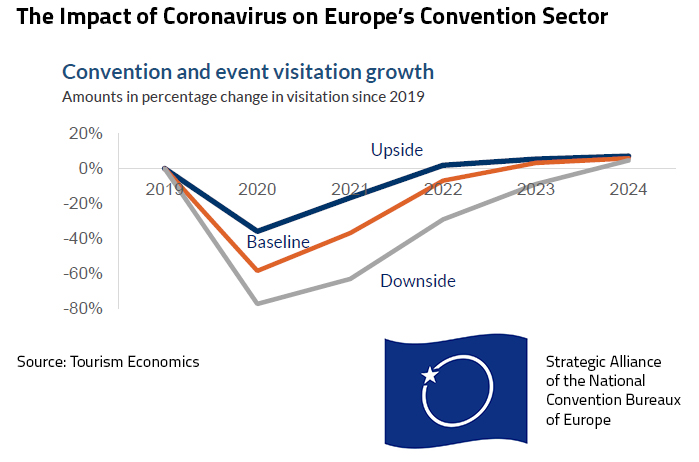
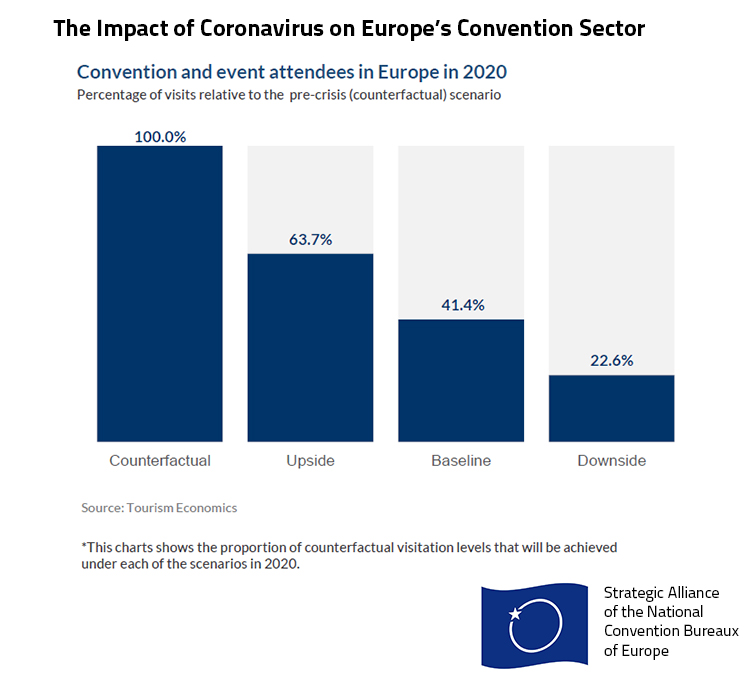
Experience with the Ambassadors Programme
|
Antoni Torrens i Jover – European Federation for Medicinal Chemistry (EFMC) It was a very positive experience for me taking part in the Associative FamTrip of the Catalunya Convention Bureau in May 2019. It was a very productive trip and perfectly organised. As a member of the Ambassadors Programme I would like to be able to organise a congress in Catalonia with the support of the CCB. The European Federation for Medicinal Chemistry (EFMC), of which I am Treasurer and member of the Executive Committee, represents 25 European countries and more than 7,500 researchers and organises two congresses every year, distributed across Europe. What I have seen and experienced on this trip around Catalonia has enabled me to confirm that we have great infrastructures, modern facilities and an excellent tourist and congress offer, and not only in Barcelona, but also in other areas such as Tarragona, Reus, Sitges, Lleida, Cardona, Girona and Lloret-Costa Brava. If to all this we add teams of people who are very capable, professional, cordial and with a profile clearly directed at the client, then the offer becomes even more attractive.
|
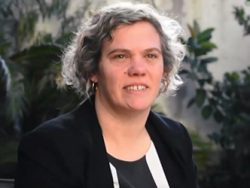
Meritxell Teixidó – Universitat Autònoma of Barcelona (UAB) Just a year ago I came to form part of the Ambassadors Programme. An experience with which, at the hand of the Catalunya Convention Bureau, I have been able to know better the potential of the Catalunya brand for the organisation of events on a world scale. I feel our tradition and culture, a key ingredient that I wanted to include in the scientific congress I am organising for September 2020 in Sitges. The 36th European and 12thInternational Peptide Symposium of which I am the Symposium Chairperson, will be the occasion where the approximately 800 delegates from around the world come together for a week in Sitges, sharing the most relevant scientific results in the field of peptides, from their preparation to biomedical uses and in the field of new materials. |
ATTENDANCE AT MEDICAL CONGRESSES COULD DECREASE AS FROM 2018
According to the data published in Hosteltur (17 February 2017), the pharmaceutical industry spends a total of 120 million euros per year for Spanish professional meetings in the sphere of health. However, this is about to change due to the funding restrictions that pharmacists plan to introduce as from the 1 January 2018.
The new ethical code of the industry passed by Eucomed concludes that the member companies of this association involved in medical technology in Europe will not provide direct economic support to health professionals in relation to their attendance at medical congresses. Therefore, it is feared that the National Business Association of the Spanish Pharmaceutical Industry will follow in the path of Eucomed and slow down meeting tourism in the medical sector.
This fact could lead to a considerable decrease in attendance of professionals at the congresses, which according to the President of the Spanish Association of Andrology, Sexual and Reproductive Medicine, “could drop by between 30 and 50%” (Nexotur, 20 February 2017).
DEL CONFLICTE A LA GOVERNANÇA EN L’ACTUAL SITUACIÓ TURÍSTICA
Aquest 24 d’abril, el conseller d’Empresa i Coneixement, Jordi Baiget, ha defensat a la conferència “Del Conflicte a la Governança” que el turisme d’avui en dia és un sector econòmic potent, tractor i font de riquesa permanent. Però els “reptes, els nous escenaris i els nous contextos” obliguen a ser més exigents.
Baiget deixà clar que “cal un canvi en l’actual sistema de governança” per poder aconseguir l’excel·lència en el sector i això es pot assolir amb “el diàleg des de la lleialtat” entre les administracions i el sector privat.
Així doncs, el conseller anuncià la redacció per part del Govern d’un Pla Territorial Sectorial de turisme que “ha de donar resposta a la implantació del turisme en el territori i ha de vetllar perquè ho faci seguint el model del turisme pel qual apostem”. Aquest és un model que defensa un sector turístic potent i generador d’oportunitats i de riquesa “per les empreses del sector, pels seus treballadors i pel territori”, com també basat en criteris de sostenibilitat i la descentralització i “que fixa l’atenció en la despesa que genera el turista“.
Per tant, segons Jordi Baiget, és important crear “espais de complicitat i de confiança” i per fer-ho ha proposat reformular la Taula de Turisme, reactivar la Comissió Interdepartamental i impulsar el Consell General de l’Agència Catalana de Turisme.



